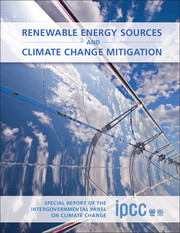 Renewable Energy Sources and Climate Change Mitigation
Renewable Energy Sources and Climate Change Mitigation Published online by Cambridge University Press: 05 December 2011
The Special Report on Renewable Energy Sources and Climate Change Mitigation (SRREN) of the IPCC Working Group III provides an assessment and thorough analysis of renewable energy technologies and their current and potential role in the mitigation of greenhouse gas emissions. The results presented here are based on an extensive assessment of scientific literature, including specifics of individual studies, but also an aggregate across studies analyzed for broader conclusions. The report combines information on technology specific studies with results of large-scale integrated models, and provides policy-relevant (but not policy-prescriptive) information to decision makers on the characteristics and technical potentials of different resources; the historical development of the technologies; the challenges of their integration and social and environmental impacts of their use; as well as a comparison in levelized cost of energy for commercially available renewable technologies with recent non-renewable energy costs. Further, the role of renewable energy sources in pursuing GHG concentration stabilization levels discussed in this report and the presentation and analysis of the policies available to assist the development and deployment of renewable energy technologies in climate change mitigation and/or other goals answer important questions detailed in the original scoping of the report.
The process
This report has been prepared in accordance with the rules and procedures established by the IPCC and used for previous assessment reports. After a scoping meeting in Lübeck, Germany from the 20th to the 25th of January, 2008, the outline of the report was approved at the 28th IPCC Plenary held in Budapest, Hungary on the 9th and 10th of April, 2008.
To save this book to your Kindle, first ensure no-reply@cambridge.org is added to your Approved Personal Document E-mail List under your Personal Document Settings on the Manage Your Content and Devices page of your Amazon account. Then enter the ‘name’ part of your Kindle email address below. Find out more about saving to your Kindle.
Note you can select to save to either the @free.kindle.com or @kindle.com variations. ‘@free.kindle.com’ emails are free but can only be saved to your device when it is connected to wi-fi. ‘@kindle.com’ emails can be delivered even when you are not connected to wi-fi, but note that service fees apply.
Find out more about the Kindle Personal Document Service.
To save content items to your account, please confirm that you agree to abide by our usage policies. If this is the first time you use this feature, you will be asked to authorise Cambridge Core to connect with your account. Find out more about saving content to Dropbox.
To save content items to your account, please confirm that you agree to abide by our usage policies. If this is the first time you use this feature, you will be asked to authorise Cambridge Core to connect with your account. Find out more about saving content to Google Drive.